MGNT803 Organizational Behaviour: Critical Analysis of Teamwork
VerifiedAdded on 2023/06/11
|15
|1631
|80
Report
AI Summary
This report provides an in-depth analysis of teams and teamwork within the context of organizational behaviour and management. It emphasizes the importance of both task work and teamwork, highlighting how they contribute to overall team effectiveness. The report delves into critical considerations for teamwork, including cognition, conflict, coaching, communication, culture, composition, context, cooperation, and coordination, which are encapsulated in the 'Nine C words'. It further explores emergent states such as cooperation, conflict, coordination, communication, coaching, and cognition, and influencing conditions like composition, culture, and context, explaining how these factors impact team dynamics and outcomes. Cooperation is identified as a key motivational driver, with trust being a crucial element. The report references various studies and approaches, underscoring the need for holistic consideration of these factors to foster effective teamwork practices. Desklib provides access to this and other solved assignments for student learning.
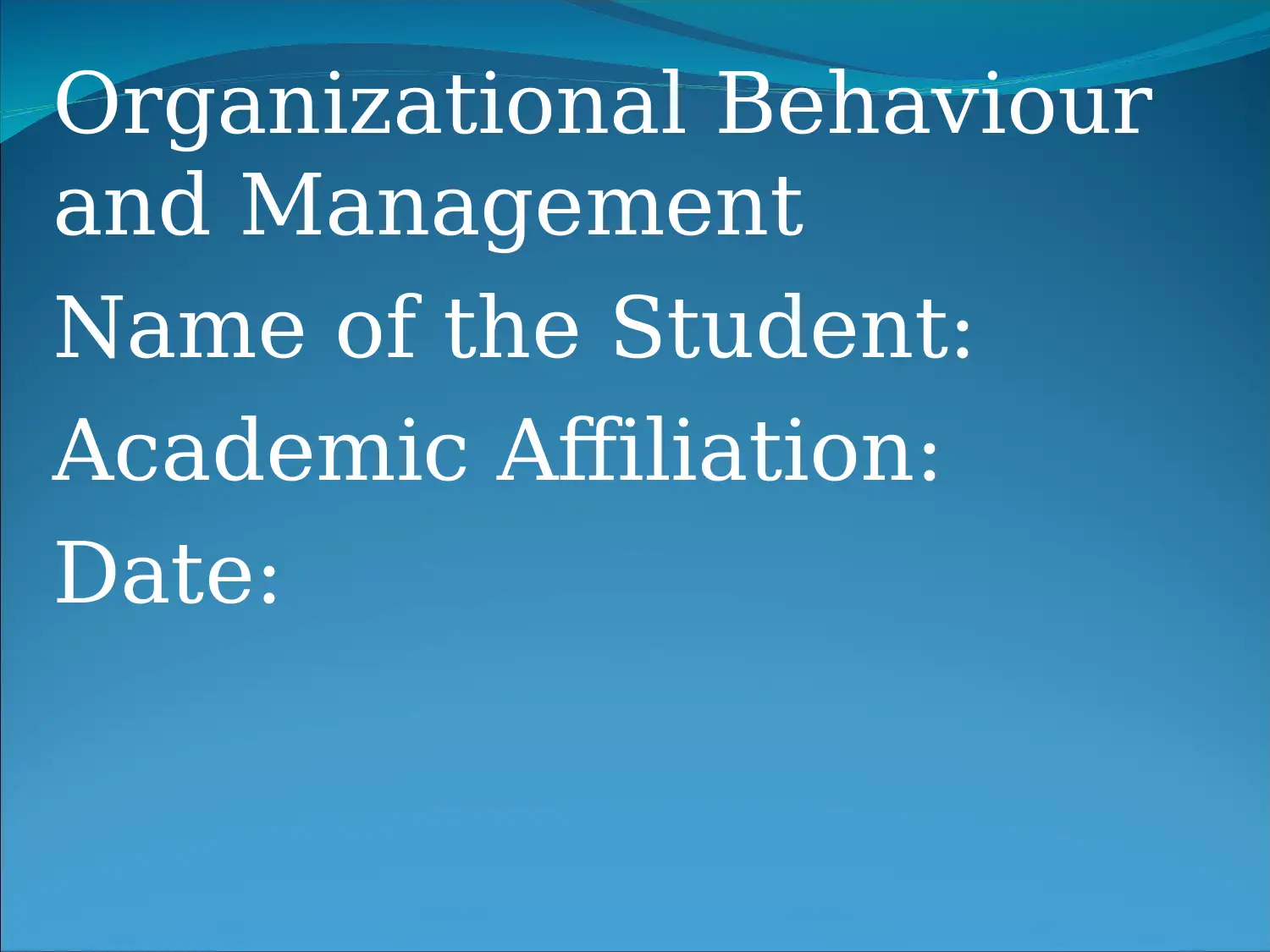
Organizational Behaviour
and Management
Name of the Student:
Academic Affiliation:
Date:
and Management
Name of the Student:
Academic Affiliation:
Date:
Paraphrase This Document
Need a fresh take? Get an instant paraphrase of this document with our AI Paraphraser
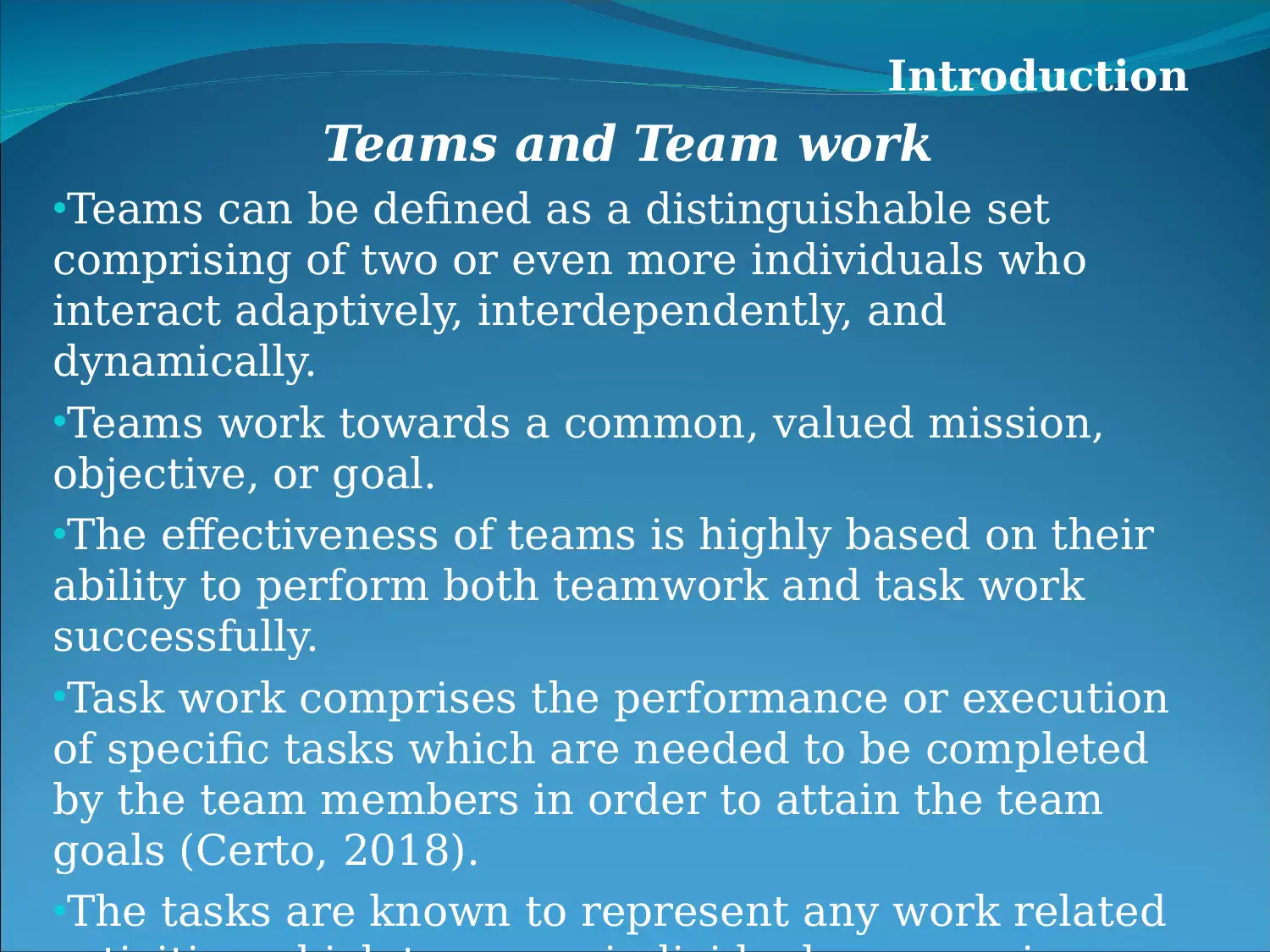
Introduction
Teams and Team work
•Teams can be defined as a distinguishable set
comprising of two or even more individuals who
interact adaptively, interdependently, and
dynamically.
•Teams work towards a common, valued mission,
objective, or goal.
•The effectiveness of teams is highly based on their
ability to perform both teamwork and task work
successfully.
•Task work comprises the performance or execution
of specific tasks which are needed to be completed
by the team members in order to attain the team
goals (Certo, 2018).
•The tasks are known to represent any work related
Teams and Team work
•Teams can be defined as a distinguishable set
comprising of two or even more individuals who
interact adaptively, interdependently, and
dynamically.
•Teams work towards a common, valued mission,
objective, or goal.
•The effectiveness of teams is highly based on their
ability to perform both teamwork and task work
successfully.
•Task work comprises the performance or execution
of specific tasks which are needed to be completed
by the team members in order to attain the team
goals (Certo, 2018).
•The tasks are known to represent any work related
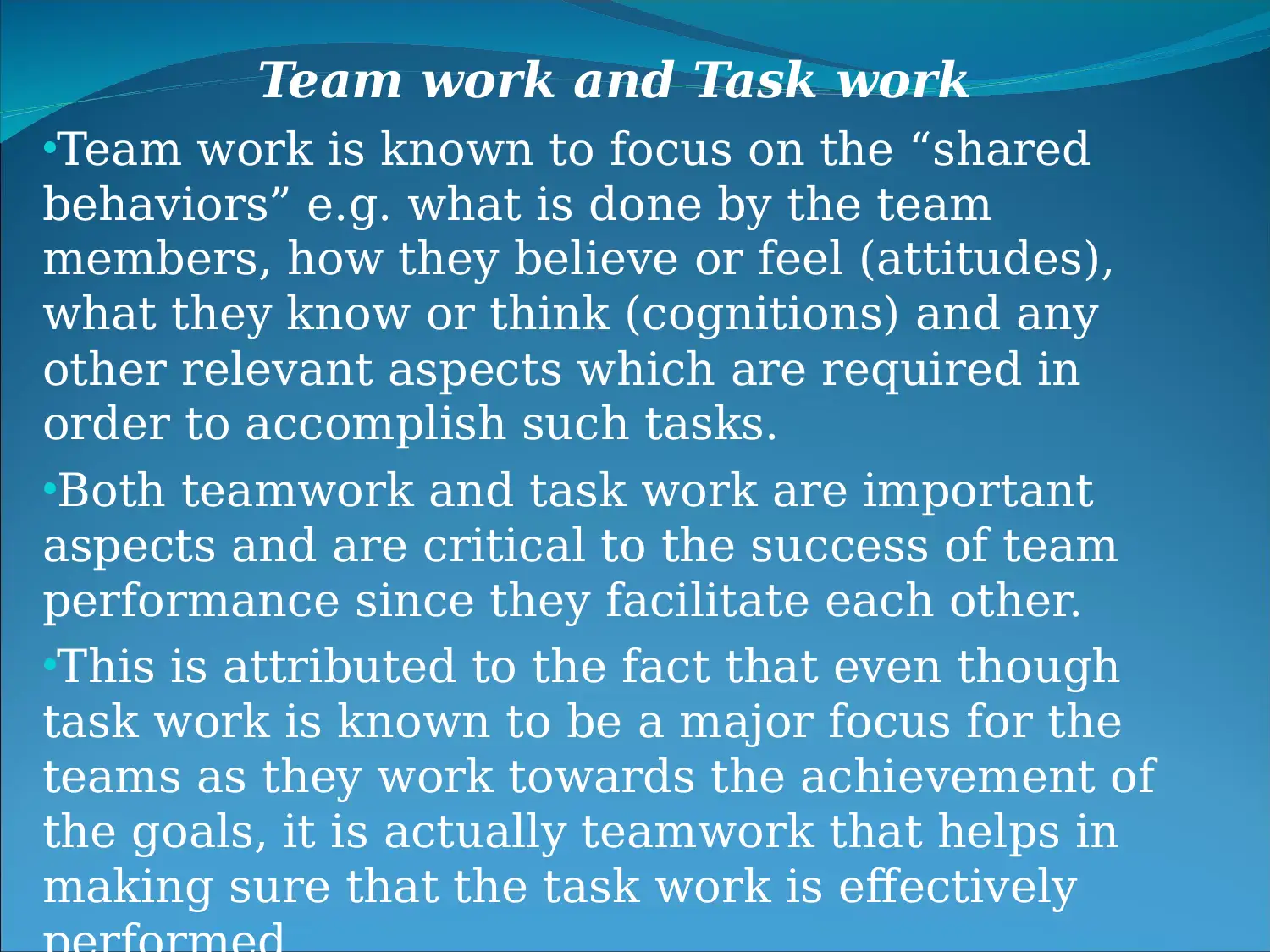
Team work and Task work
•Team work is known to focus on the “shared
behaviors” e.g. what is done by the team
members, how they believe or feel (attitudes),
what they know or think (cognitions) and any
other relevant aspects which are required in
order to accomplish such tasks.
•Both teamwork and task work are important
aspects and are critical to the success of team
performance since they facilitate each other.
•This is attributed to the fact that even though
task work is known to be a major focus for the
teams as they work towards the achievement of
the goals, it is actually teamwork that helps in
making sure that the task work is effectively
•Team work is known to focus on the “shared
behaviors” e.g. what is done by the team
members, how they believe or feel (attitudes),
what they know or think (cognitions) and any
other relevant aspects which are required in
order to accomplish such tasks.
•Both teamwork and task work are important
aspects and are critical to the success of team
performance since they facilitate each other.
•This is attributed to the fact that even though
task work is known to be a major focus for the
teams as they work towards the achievement of
the goals, it is actually teamwork that helps in
making sure that the task work is effectively
⊘ This is a preview!⊘
Do you want full access?
Subscribe today to unlock all pages.

Trusted by 1+ million students worldwide
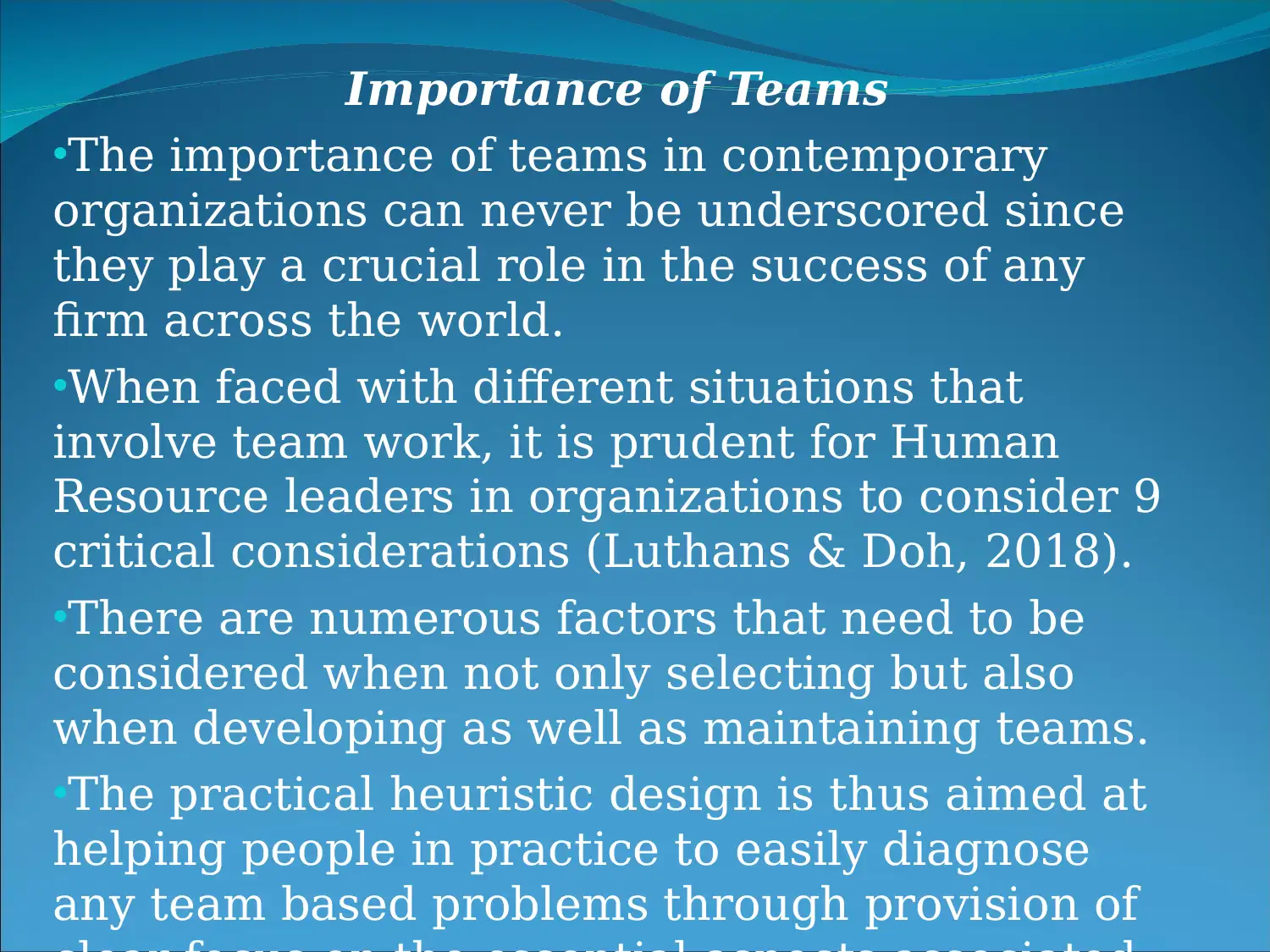
Importance of Teams
•The importance of teams in contemporary
organizations can never be underscored since
they play a crucial role in the success of any
firm across the world.
•When faced with different situations that
involve team work, it is prudent for Human
Resource leaders in organizations to consider 9
critical considerations (Luthans & Doh, 2018).
•There are numerous factors that need to be
considered when not only selecting but also
when developing as well as maintaining teams.
•The practical heuristic design is thus aimed at
helping people in practice to easily diagnose
any team based problems through provision of
•The importance of teams in contemporary
organizations can never be underscored since
they play a crucial role in the success of any
firm across the world.
•When faced with different situations that
involve team work, it is prudent for Human
Resource leaders in organizations to consider 9
critical considerations (Luthans & Doh, 2018).
•There are numerous factors that need to be
considered when not only selecting but also
when developing as well as maintaining teams.
•The practical heuristic design is thus aimed at
helping people in practice to easily diagnose
any team based problems through provision of
Paraphrase This Document
Need a fresh take? Get an instant paraphrase of this document with our AI Paraphraser
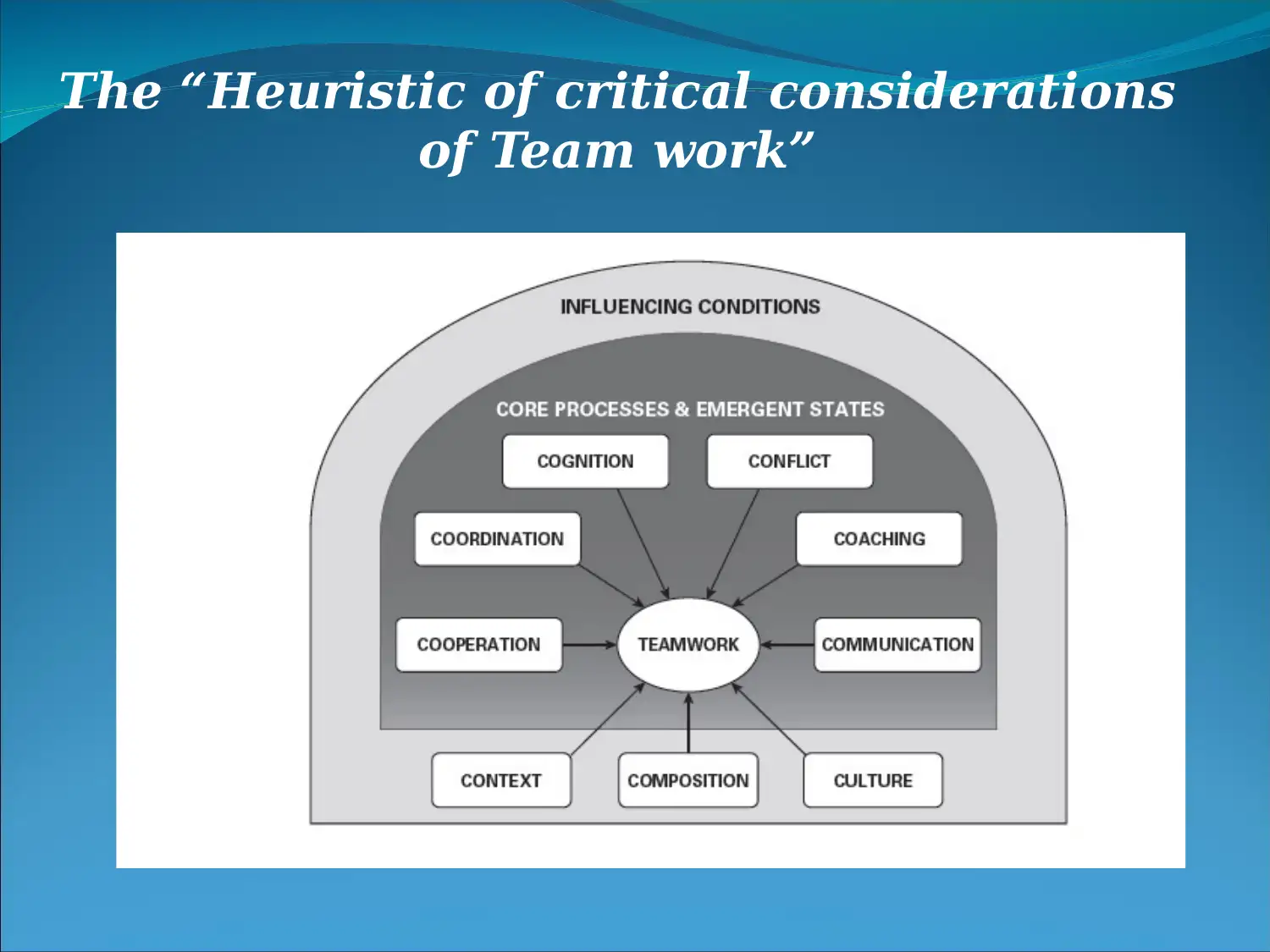
The “Heuristic of critical considerations
of Team work”
of Team work”
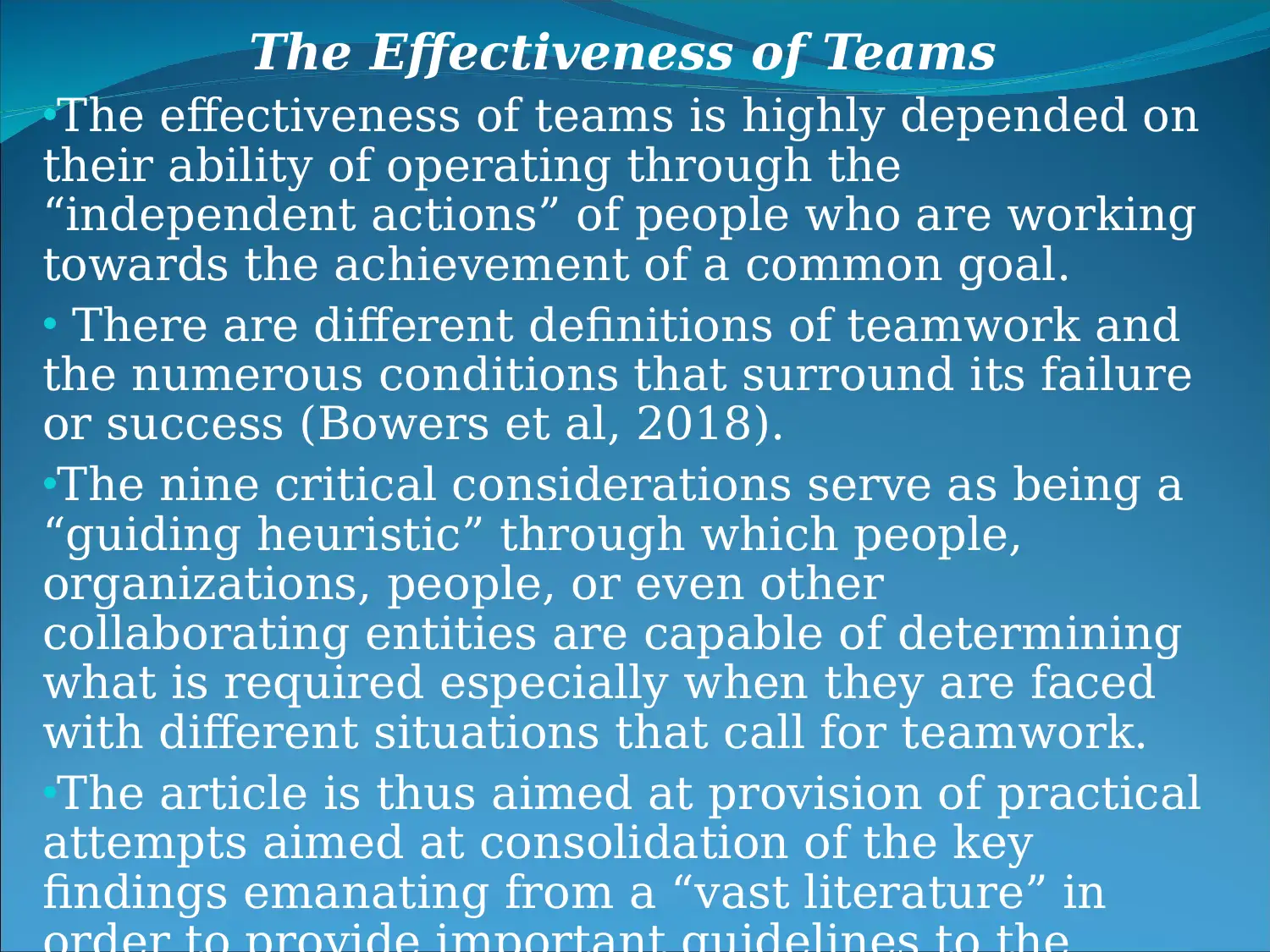
The Effectiveness of Teams
•The effectiveness of teams is highly depended on
their ability of operating through the
“independent actions” of people who are working
towards the achievement of a common goal.
• There are different definitions of teamwork and
the numerous conditions that surround its failure
or success (Bowers et al, 2018).
•The nine critical considerations serve as being a
“guiding heuristic” through which people,
organizations, people, or even other
collaborating entities are capable of determining
what is required especially when they are faced
with different situations that call for teamwork.
•The article is thus aimed at provision of practical
attempts aimed at consolidation of the key
findings emanating from a “vast literature” in
•The effectiveness of teams is highly depended on
their ability of operating through the
“independent actions” of people who are working
towards the achievement of a common goal.
• There are different definitions of teamwork and
the numerous conditions that surround its failure
or success (Bowers et al, 2018).
•The nine critical considerations serve as being a
“guiding heuristic” through which people,
organizations, people, or even other
collaborating entities are capable of determining
what is required especially when they are faced
with different situations that call for teamwork.
•The article is thus aimed at provision of practical
attempts aimed at consolidation of the key
findings emanating from a “vast literature” in
⊘ This is a preview!⊘
Do you want full access?
Subscribe today to unlock all pages.

Trusted by 1+ million students worldwide
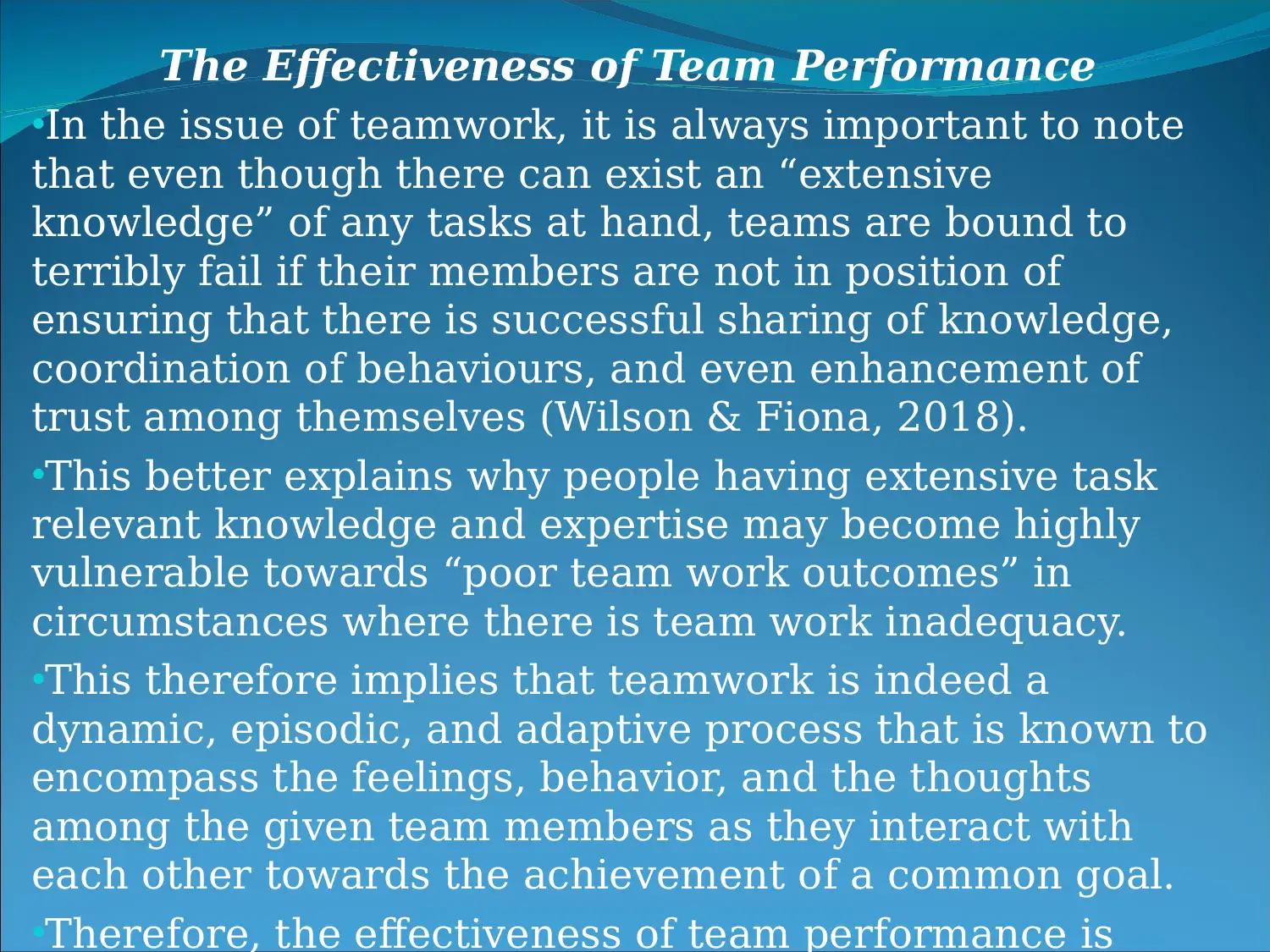
The Effectiveness of Team Performance
•In the issue of teamwork, it is always important to note
that even though there can exist an “extensive
knowledge” of any tasks at hand, teams are bound to
terribly fail if their members are not in position of
ensuring that there is successful sharing of knowledge,
coordination of behaviours, and even enhancement of
trust among themselves (Wilson & Fiona, 2018).
•This better explains why people having extensive task
relevant knowledge and expertise may become highly
vulnerable towards “poor team work outcomes” in
circumstances where there is team work inadequacy.
•This therefore implies that teamwork is indeed a
dynamic, episodic, and adaptive process that is known to
encompass the feelings, behavior, and the thoughts
among the given team members as they interact with
each other towards the achievement of a common goal.
•Therefore, the effectiveness of team performance is
•In the issue of teamwork, it is always important to note
that even though there can exist an “extensive
knowledge” of any tasks at hand, teams are bound to
terribly fail if their members are not in position of
ensuring that there is successful sharing of knowledge,
coordination of behaviours, and even enhancement of
trust among themselves (Wilson & Fiona, 2018).
•This better explains why people having extensive task
relevant knowledge and expertise may become highly
vulnerable towards “poor team work outcomes” in
circumstances where there is team work inadequacy.
•This therefore implies that teamwork is indeed a
dynamic, episodic, and adaptive process that is known to
encompass the feelings, behavior, and the thoughts
among the given team members as they interact with
each other towards the achievement of a common goal.
•Therefore, the effectiveness of team performance is
Paraphrase This Document
Need a fresh take? Get an instant paraphrase of this document with our AI Paraphraser
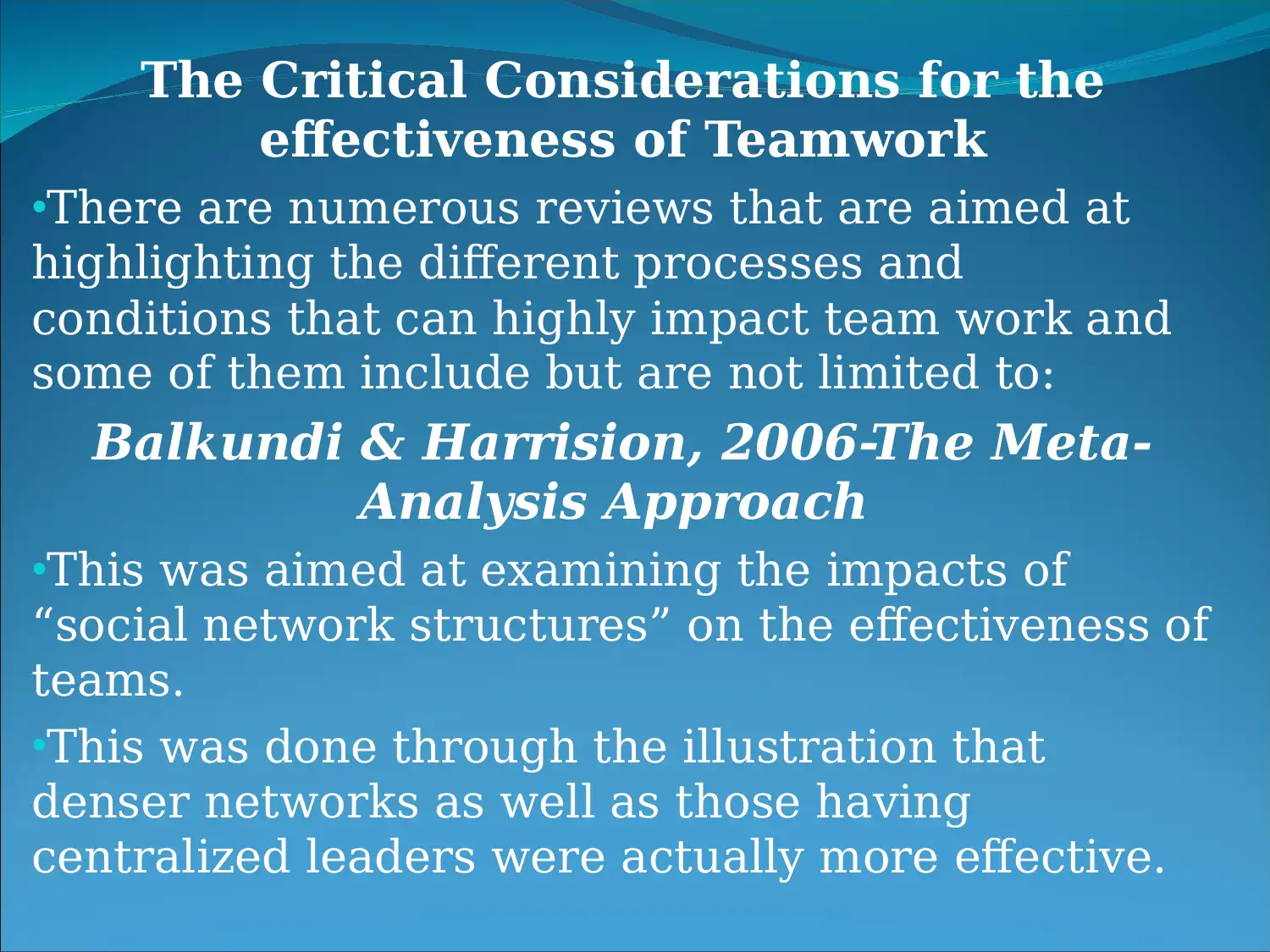
The Critical Considerations for the
effectiveness of Teamwork
•There are numerous reviews that are aimed at
highlighting the different processes and
conditions that can highly impact team work and
some of them include but are not limited to:
Balkundi & Harrision, 2006-The Meta-
Analysis Approach
•This was aimed at examining the impacts of
“social network structures” on the effectiveness of
teams.
•This was done through the illustration that
denser networks as well as those having
centralized leaders were actually more effective.
effectiveness of Teamwork
•There are numerous reviews that are aimed at
highlighting the different processes and
conditions that can highly impact team work and
some of them include but are not limited to:
Balkundi & Harrision, 2006-The Meta-
Analysis Approach
•This was aimed at examining the impacts of
“social network structures” on the effectiveness of
teams.
•This was done through the illustration that
denser networks as well as those having
centralized leaders were actually more effective.
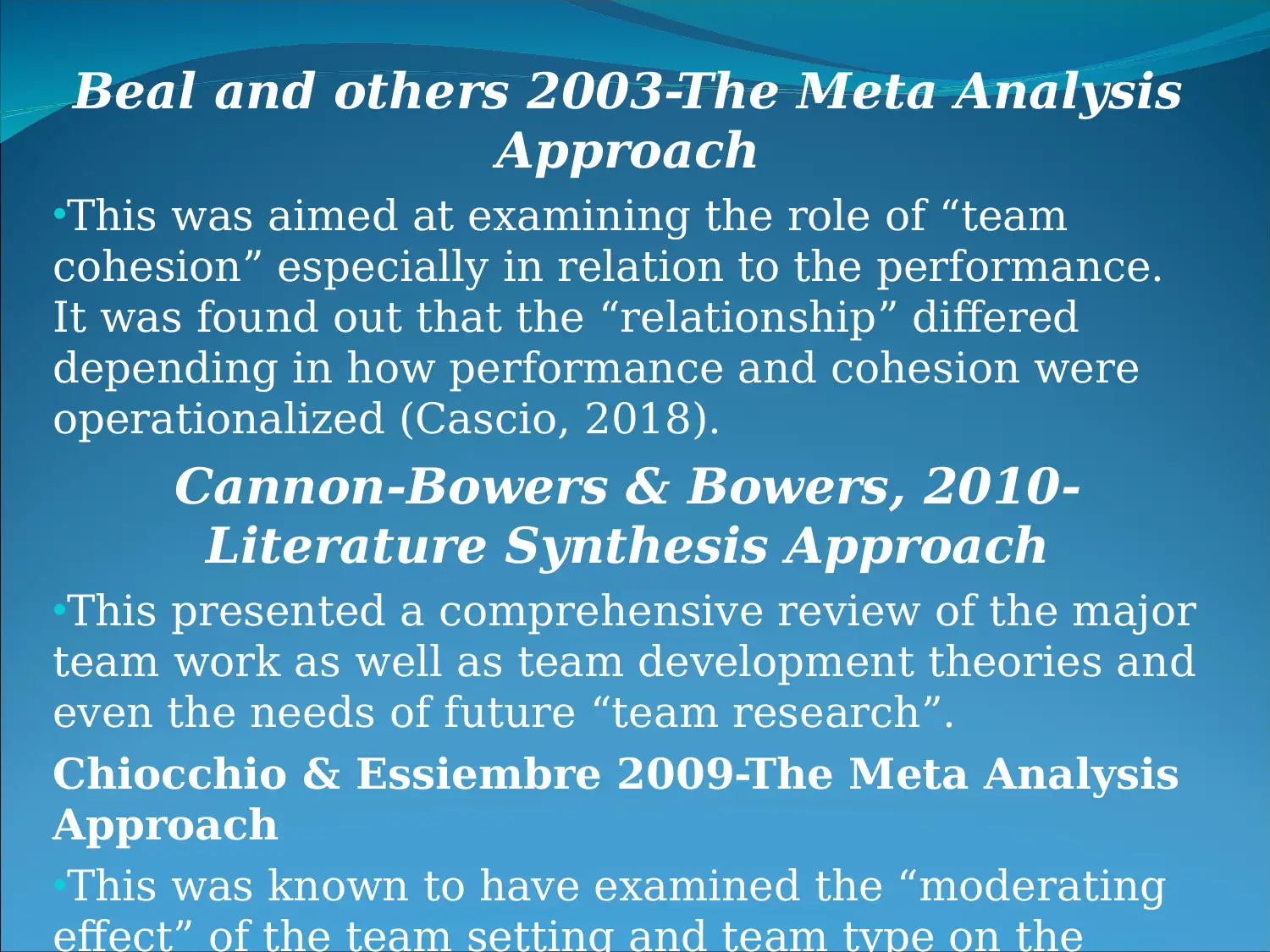
Beal and others 2003-The Meta Analysis
Approach
•This was aimed at examining the role of “team
cohesion” especially in relation to the performance.
It was found out that the “relationship” differed
depending in how performance and cohesion were
operationalized (Cascio, 2018).
Cannon-Bowers & Bowers, 2010-
Literature Synthesis Approach
•This presented a comprehensive review of the major
team work as well as team development theories and
even the needs of future “team research”.
Chiocchio & Essiembre 2009-The Meta Analysis
Approach
•This was known to have examined the “moderating
effect” of the team setting and team type on the
Approach
•This was aimed at examining the role of “team
cohesion” especially in relation to the performance.
It was found out that the “relationship” differed
depending in how performance and cohesion were
operationalized (Cascio, 2018).
Cannon-Bowers & Bowers, 2010-
Literature Synthesis Approach
•This presented a comprehensive review of the major
team work as well as team development theories and
even the needs of future “team research”.
Chiocchio & Essiembre 2009-The Meta Analysis
Approach
•This was known to have examined the “moderating
effect” of the team setting and team type on the
⊘ This is a preview!⊘
Do you want full access?
Subscribe today to unlock all pages.

Trusted by 1+ million students worldwide
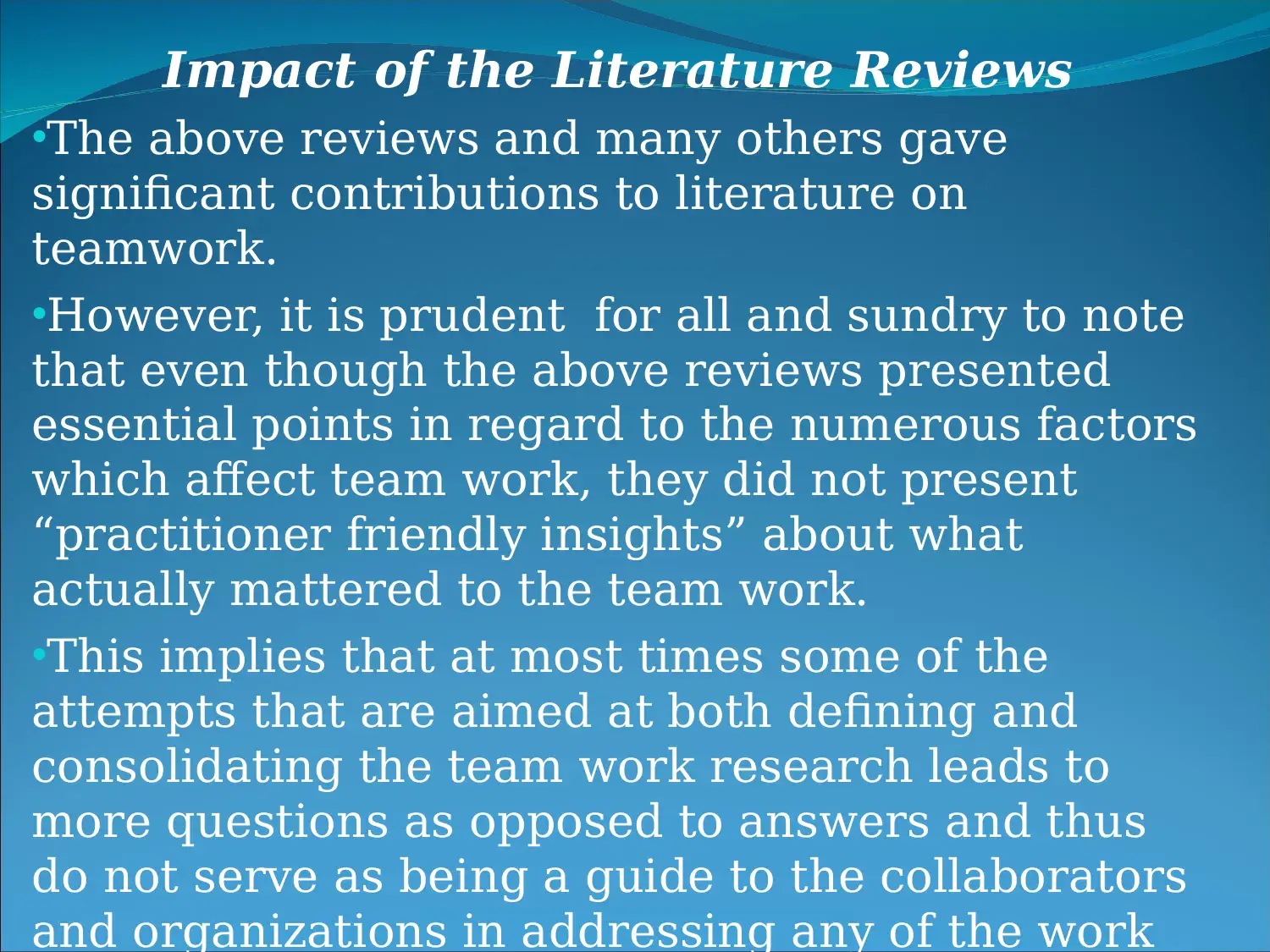
Impact of the Literature Reviews
•The above reviews and many others gave
significant contributions to literature on
teamwork.
•However, it is prudent for all and sundry to note
that even though the above reviews presented
essential points in regard to the numerous factors
which affect team work, they did not present
“practitioner friendly insights” about what
actually mattered to the team work.
•This implies that at most times some of the
attempts that are aimed at both defining and
consolidating the team work research leads to
more questions as opposed to answers and thus
do not serve as being a guide to the collaborators
and organizations in addressing any of the work
•The above reviews and many others gave
significant contributions to literature on
teamwork.
•However, it is prudent for all and sundry to note
that even though the above reviews presented
essential points in regard to the numerous factors
which affect team work, they did not present
“practitioner friendly insights” about what
actually mattered to the team work.
•This implies that at most times some of the
attempts that are aimed at both defining and
consolidating the team work research leads to
more questions as opposed to answers and thus
do not serve as being a guide to the collaborators
and organizations in addressing any of the work
Paraphrase This Document
Need a fresh take? Get an instant paraphrase of this document with our AI Paraphraser
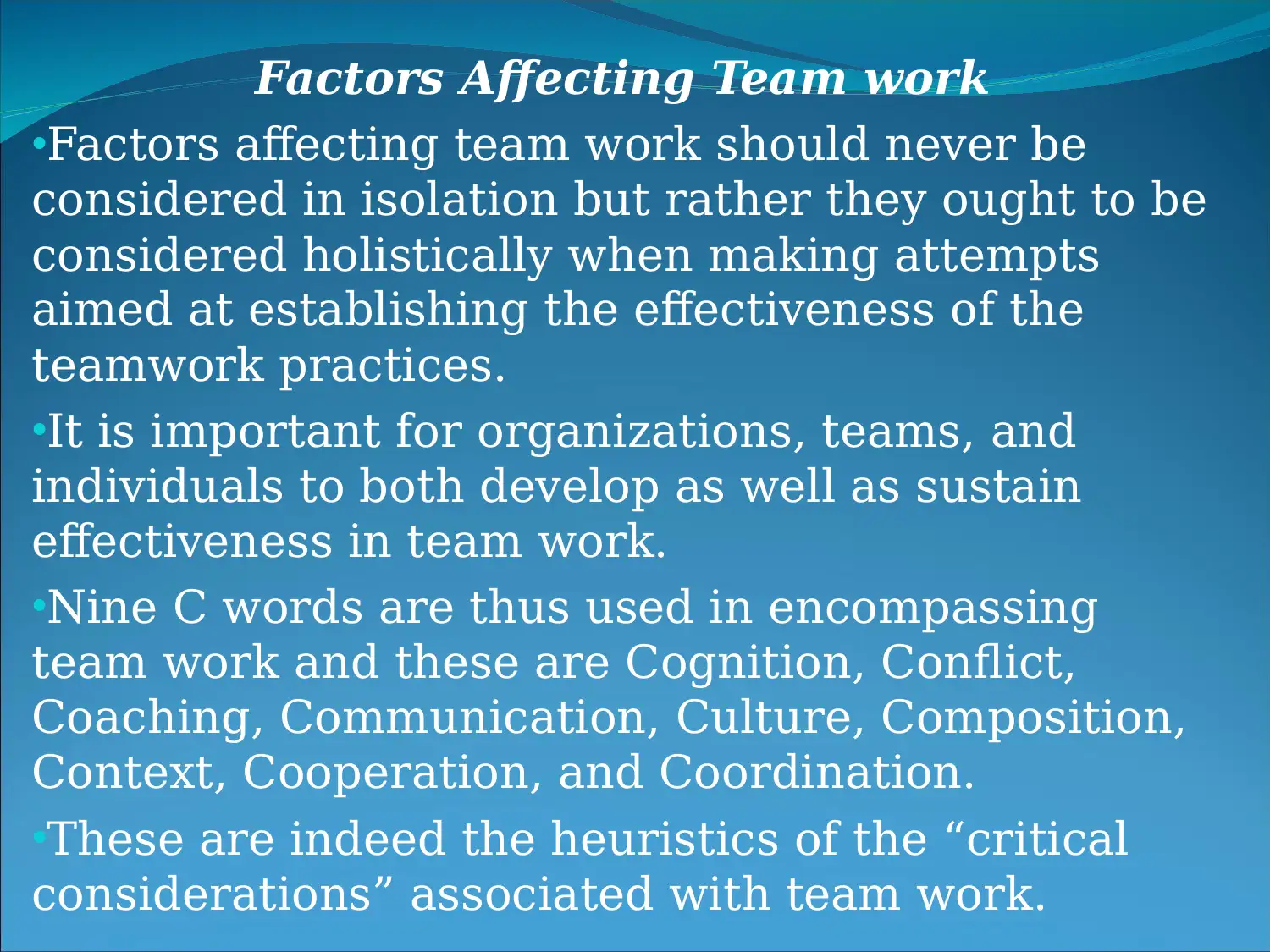
Factors Affecting Team work
•Factors affecting team work should never be
considered in isolation but rather they ought to be
considered holistically when making attempts
aimed at establishing the effectiveness of the
teamwork practices.
•It is important for organizations, teams, and
individuals to both develop as well as sustain
effectiveness in team work.
•Nine C words are thus used in encompassing
team work and these are Cognition, Conflict,
Coaching, Communication, Culture, Composition,
Context, Cooperation, and Coordination.
•These are indeed the heuristics of the “critical
considerations” associated with team work.
•Factors affecting team work should never be
considered in isolation but rather they ought to be
considered holistically when making attempts
aimed at establishing the effectiveness of the
teamwork practices.
•It is important for organizations, teams, and
individuals to both develop as well as sustain
effectiveness in team work.
•Nine C words are thus used in encompassing
team work and these are Cognition, Conflict,
Coaching, Communication, Culture, Composition,
Context, Cooperation, and Coordination.
•These are indeed the heuristics of the “critical
considerations” associated with team work.
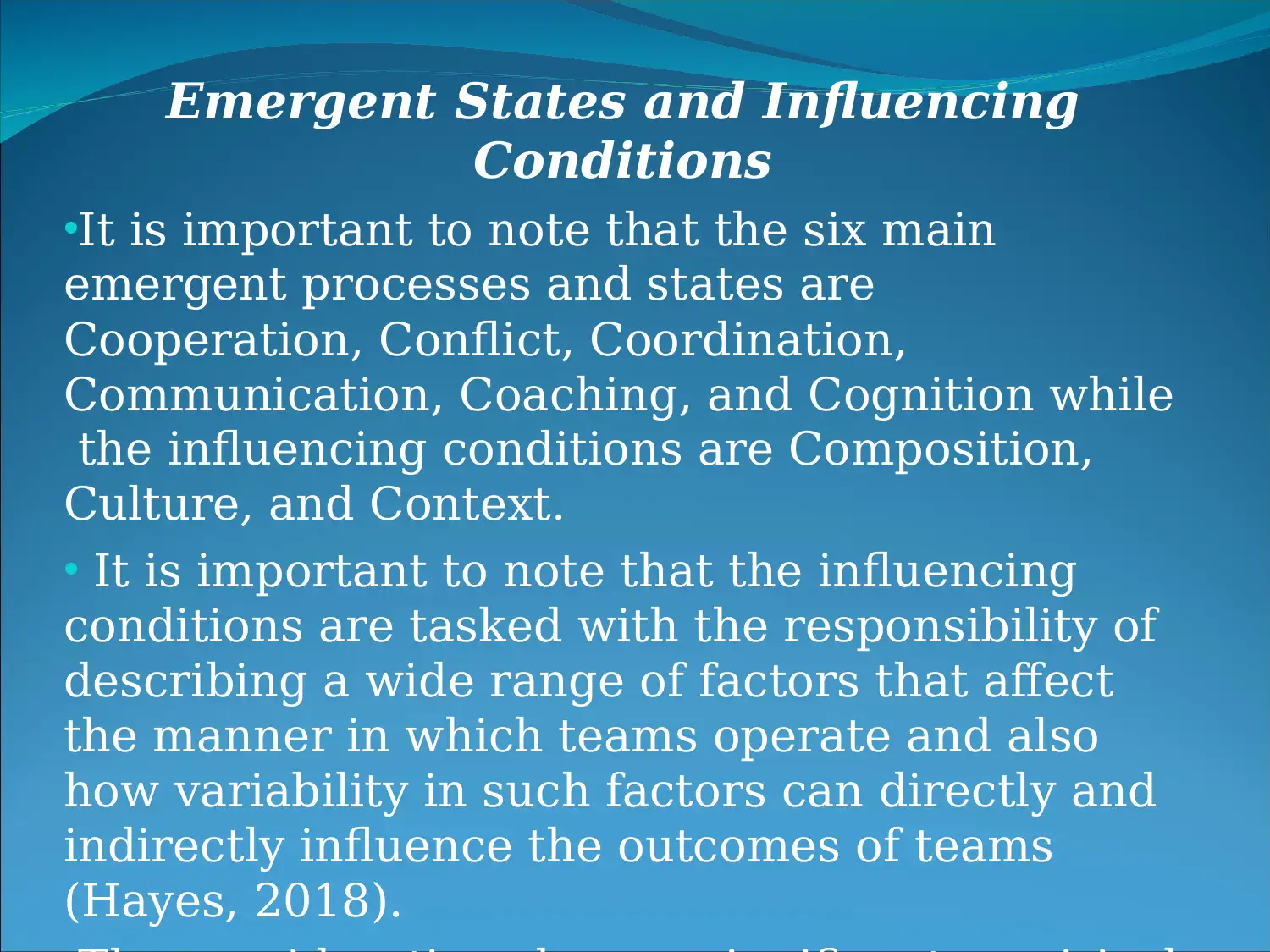
Emergent States and Influencing
Conditions
•It is important to note that the six main
emergent processes and states are
Cooperation, Conflict, Coordination,
Communication, Coaching, and Cognition while
the influencing conditions are Composition,
Culture, and Context.
• It is important to note that the influencing
conditions are tasked with the responsibility of
describing a wide range of factors that affect
the manner in which teams operate and also
how variability in such factors can directly and
indirectly influence the outcomes of teams
(Hayes, 2018).
Conditions
•It is important to note that the six main
emergent processes and states are
Cooperation, Conflict, Coordination,
Communication, Coaching, and Cognition while
the influencing conditions are Composition,
Culture, and Context.
• It is important to note that the influencing
conditions are tasked with the responsibility of
describing a wide range of factors that affect
the manner in which teams operate and also
how variability in such factors can directly and
indirectly influence the outcomes of teams
(Hayes, 2018).
⊘ This is a preview!⊘
Do you want full access?
Subscribe today to unlock all pages.

Trusted by 1+ million students worldwide
1 out of 15
Related Documents
Your All-in-One AI-Powered Toolkit for Academic Success.
+13062052269
info@desklib.com
Available 24*7 on WhatsApp / Email
![[object Object]](/_next/static/media/star-bottom.7253800d.svg)
Unlock your academic potential
Copyright © 2020–2026 A2Z Services. All Rights Reserved. Developed and managed by ZUCOL.




